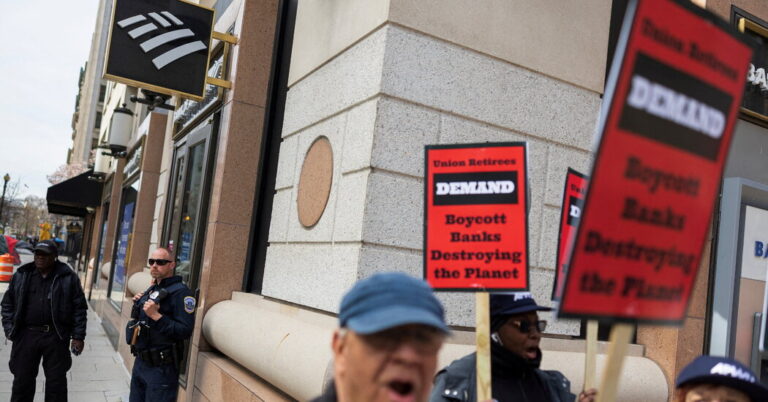Bank of America won praise from climate activists two years ago when it announced it would no longer finance new coal mines, coal-fired power plants or Arctic drilling projects because of their environmental costs.
The bank's latest environmental and social risk policy reneges on these promises. The policy, updated in December, says such projects will instead be subject to “enhanced due diligence.”
Bank of America's changes come in the wake of growing opposition from Republican lawmakers to companies considering environmental and social factors in their operations. Wall Street in particular has come under fire for a campaign that has drawn banks into a broader culture war on what some Republicans call “woke capitalism.”
States such as Texas and West Virginia have passed financial regulations aimed at thwarting efforts to deny fossil fuel companies access to banking services. In New Hampshire, the state legislature is seeking to criminalize a business principle known as ESG, which stands for environmental, social, and governance.
These actions sent chills through the ESG world. Last year, major investors withdrew sustainability-focused funds from the sector in record time amid conservative criticism. Larry Fink, CEO of asset management firm BlackRock and a former prominent supporter of ESG, said last June that he stopped using the term because it had become too politicized.
Bank of America said in a statement that “high-risk customers and transactions continue to undergo enhanced due diligence processes, including senior-level risk reviews.”
In late 2021, the bank said its policy was not to directly finance “new thermal coal mines or expansions of existing mines” or “oil exploration and production activities in the Arctic.” It also won't “directly finance the construction or expansion of new coal-fired power plants, including the refinancing of recently constructed power plants,” unless the plants employ carbon capture or similar technologies. .
Coal, a major cause of global warming, faces “significant challenges” as the world steps up efforts to tackle the climate crisis, the bank said at the time. Additionally, Bank of America said it recognizes that “the Arctic is a unique region with special considerations, including marine life and wildlife, fragile ecosystems, and the rights of indigenous peoples.” Ta.
That language has been removed from the updated policy.
The bank declined to provide details about what the risk review would include.
There were other controversial changes as well. In its annual climate report, JPMorgan Chase & Co. in November overhauled the oil and gas emissions reduction targets that guide energy investments and set new targets to take into account financing of clean energy projects. announced that it would adopt an “energy mix” target.
Environmental groups criticized the change, saying it obscured JPMorgan's previous goals.
JPMorgan said in a statement at the time that the revised targets recognize that “an exclusive focus on fossil fuels will not successfully achieve the transition needed for the world's energy system.”
Global conflicts in Europe and the Middle East are also pushing banks’ focus beyond ESG Citigroup CEO Jane Fraser said at a recent conference in Saudi Arabia that the tensions are prompting banks to prioritize energy security. Energy security proponents tend to prioritize uninterrupted energy production over environmental concerns.
“There's a new 'S' in ESG, and that's security: food security, energy security, defense, financial security,” Fraser said. “It's certainly a topic that all CEOs around the world are talking about.”
Even before the recent reversal, large amounts of money were flowing to coal, oil and gas companies. Fossil fuel lending from the world's 60 largest banks reached $669 billion in 2022, according to a tally by an advocacy group that tracks banks' performance on climate change.
In the seven years since the landmark 2015 Paris Agreement, in which nearly every country in the world agreed to cut emissions of greenhouse gases that cause global warming, the same banks have given the fossil fuel industry about $5.5 trillion. It is said that the funds were financed. totalling.
Emissions from burning fossil fuels for energy are the largest contributor to global climate change. The International Energy Agency, the world's leading energy agency, says countries around the world must immediately stop approving new coal-fired power plants and new oil and gas fields if they want to avoid the most devastating effects of climate change. He said there is.
For environmentalists, the bank's withdrawal has implications beyond the loans themselves. This “sends a very bad signal,” said Lucy Pinson, director of Reclaim Finance, a nonprofit organization that scrutinizes fossil fuel companies' climate change strategies. “Bank of America is sending a message to its customers that it's OK to tap into new fossil fuel assets,” he said. “We should have stopped developing such assets years ago.”


